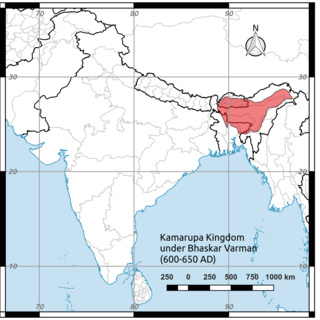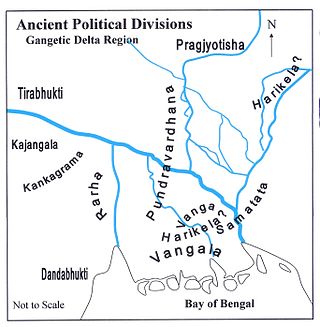
Bhaskarbarman was king of medieval Kamarupa and the last of the Barman dynasty. After being captured by the Gauda king during the reign of his father, he was able to re-establish the rule of the Varmans. He made political alliances with Harshavardhana of Thaneswar, against the alliance of the Gauda and East Malwa. He was visited by Xuanzang and Wang Xuance, the envoys of the Tang dynasty who have left accounts of the king and the kingdom.

Pushyavarman was the first historical ruler of Kamarupa (Assam) in eastern India, who established the Varman dynasty in 350 AD.

Kalyanavarman ruled Kamarupa from the Varman dynasty for the period of 422–446 A.D. He was the son of Kamrupi king Balavarman and queen Ratnavati. He married Gandharvavati and had a successor to throne named Ganapativarman.

Ganapativarman ruled Kamarupa from the Varman dynasty for the period 446-470 A.D, was son of Kamrupi king Kalyanavarman and queen Gandharvavati. He married Yajnavati and had successor to throne named Mahendravarman.

Mahendravarman ruled Kamarupa from the Varman dynasty for the period 470–494 CE, was son of King Ganapativarman and Queen Yajnavati.

Narayanavarman ruled Kamarupa from the Varman dynasty for the period 494–518, was son of Kamarupi King Mahendravarman and Queen Suvrata. He married Devavati and had successor to throne named Bhutivarman.

Bhutivarman or Mahabhutavarman, ruled Kamarupa from the Varman dynasty for the period 518-542, was son of Kamarupi King Narayanavarman and Queen Devavati.

Chandramukhavarman ruled Kamarupa from the Varman dynasty for the period 542–566, was son of Kamarupi King Bhutivarman and Queen Vijnanavati.

Sthitavarman ruled Kamarupa from the Varman dynasty for the period 566-590, was son of Kamarupi King Chandramukhavarman and Queen Bhogavati.

Susthitavarman (590-595) was a ruler of Kamarupa. He was a son of Sthitavarman and Queen Nayanadevi.

Supratisthitavarman ruled Kamarupa from the Varman dynasty for the period 595–600. He was son of King Susthitavarman and Queen Shyamadevi.

Brahma Pala was the founder of the Pala Dynasty (900–1100) of the Kamarupa kingdom. He married Kula Devi, by whom he had a successor to his throne named Ratna Pala.

Ratna Pala was the son of Brahma Pala in Pala Dynasty (900–1100) of Kamarupa Kingdom. He was succeeded by his grandson Indra Pala.

Indra Pala was ruler of Pala Dynasty (900–1100) of Kamarupa Kingdom.

Jaya Pala (1075-1100) was a ruler during the Pala Dynasty (900–1100) of Kamarupa Kingdom.

Dharma Pala (1035–1060) was ruler of Pala dynasty of Kamarupa Kingdom. He was the son and the successor of Harsha Pala.

Go Pala was successor and son of Indra Pala and his queen Rajya Devi, of Pala Dynasty of Kamarupa Kingdom, who ruled for the period 990-1015 A.D.

Kamarupa was a kingdom in Northeast India that was ruled by three dynasties from their capitals in Pragjyotishpura, Haruppeshwara, and Durjaya. The kingdom was known for its power and influence in the region.

Kamarupa – Late to end period was a period of Kamarupa kingdom from founding of Pala Dynasty by Brahma Pala to last ruler of dynasty Jaya Pala.

The Varman Dynasty was a Hindu Yadava dynasty of Indian subcontinent which ruled Bengal, and later East Bihar (Anga). The Varmans established their supremacy after replacing the Chandra Dynasty. Their capital was at Bikrampur in present-day Munshiganj District of Bangladesh.




